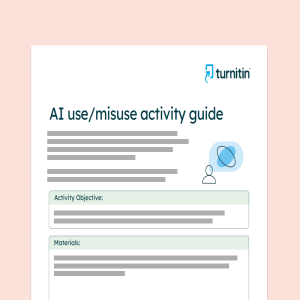Skill development is of utmost importance in education, because it is the outcome of learning and what a diploma represents. Academic leaders should be confident that students graduate from an institution with the skills they need to progress in their learning journey, whether through further schooling or in the workplace.
Skill development spans many categories, from interpersonal skills to technical to cognitive development; a student not only needs to have a conceptual understanding of subjects but also the ability to execute their knowledge. Do they understand the interaction between water and salt, and can they complete a lab experiment? Why does salt dissolve in water? Or what is the plot of Hamlet? And how does the plot support major themes within Hamlet?
Furthermore, interpersonal skill development enables students to communicate and interact with peers in a way that will progress their relationship with learning and with others. Academic misconduct, for instance, is an indicator of future workplace misbehavior while academic integrity is an indicator of future good citizenship (Mulisa, et. al., 2021 , Guerrero-Dib, et al., 2020 , Orosz, et. al., 2018 , Grym & Liljander, 2017 , Ma, 2011 , Graves, 2008 , Harding, et. al., 2004 , Nonis & Swift, 2001 , Sims 1993 ).
AI and its presence within education—in the form of AI-writing tools, AI-powered education software, and otherwise—is complex, with direct impacts on skill development. How will AI impact skill development in education?
What are the types of skill development?Skills development is divided into three categories: cognitive, technical, and interpersonal skills (Axen, 2023 ).
When students have cognitive skills, they are able to understand concepts and proceed to next steps in learning. This skillset is often what people perceive as academic knowledge.
Technical skills focus on the ability to perform tasks like writing, reading, math, or using computer software. They are otherwise known as hard skills obtained through training and experience.
Finally, interpersonal skills, sometimes referred to as “soft skills,” focus on how a student does their work. Examples of interpersonal or soft skills include time management, teamwork, and self discipline. They often inform the development of cognitive and technical skill development.
What is the process of skill development?As with many learning goals, the process of skill development involves identifying gaps and then honing skills to fill those gaps. This may involve beginning of term assessments or evaluations, and in the case of interpersonal skills, some self-assessment or observation on the part of the teacher.
In psychology, the four stages of competence reflect this skill development process: unconscious incompetence, conscious incompetence, conscious competence, and unconscious competence. In this model, individuals are unaware of what they do or do not know, then recognize their lack of skill before consciously acquiring that skill. Finally, the individual then uses the skill without having to actively think about it.
In an educational context, the instructor facilitates the student through these stages via instruction, frequent and low-stakes assessments , feedback , and support, towards the stated learning outcomes. Academic leaders, too, inform curriculum to enable skill development.
AI is an expansive field that goes beyond generative AI writing tools like ChatGPT. Artificial Intelligence powers a wide variety of modern functions, including speech recognition, stock trading, and educational technology.
The fact of the matter is that AI, like most technology, has its upsides and downsides.
If skill development is about gaining competence through repeated exercise, and AI writing tools shortcut student opportunities to practice those skills, then AI has a negative impact on skill development.
If AI can be used to power edtech software that enables fair, actionable, specific, and timely feedback to students, then AI has a positive impact on skill development (Hattie, et al., 2021 ). Similarly, generative AI writing tools, if properly used, can also uphold learning, particularly for language learners who may need scaffolding as they develop skills. If workplace environments require knowledge of AI writing tools, learning how to use them properly as students supports technical skill development.
AI, when appropriately used at specified learning stages or to enable learning, can accelerate skill development. What’s at stake, though, are the opportunities lost through misuse, which can be summed up as “using it without telling the teacher,” whether by not including citations or using it for an assignment that is supposed to be written solely by the student and then representing it as their own original work. Even then, these may be learning opportunities to uphold academic integrity; by instructing students about authorship and original ideas and citation, every setback can also be an opportunity for further skill development .
Complicating the landscape for AI and skill development is the fact that generative AI writing tools are used fairly often in the professional workplace. Journalism, for instance, has been using AI writing tools to generate articles. If students are expected to be able to use AI writing tools and they are banned from using it as students, then they may graduate into the workplace without this technical skill. In this particular case, AI writing tools are themselves a technical skill to develop.
On the other hand, there are those who predict even more extreme change. An earlier report by the Brookings Institute on the matter of AI in education and the workplace predicted that many jobs currently performed by humans will be performed by robots in the near future, and at the same time, new jobs will be created as technology advances.” The corollary to this prediction was to urge education institutions to “prepare students to remain competitive in the labor market, and postsecondary institutions must provide students and displaced workers with relevant education and retraining opportunities. Innovations in technology will also create new tools to support educators, students, and others seeking retraining and employment” (Levesque, 2018 ).
We are in a momentous state of transition, such that many of us, as the American saying goes, “cannot see the forest for the trees .” In other words, so much is happening in close proximity that it is nearly impossible to see the big picture. Will AI writing tools be a technical skill that employees need to use? Or will AI-powered robots replace humans? These ongoing discussions are part of the complex conversation.
Regardless of how the transition may resolve, students will graduate into a marketplace of ideas very different from the industrial era of the early twentieth century when schools began proliferating and many curriculums prepped students to work in factories. Our students today will need to problem solve, think critically, offer up original ideas , and engage in teamwork. The same Brookings Institute report concludes, “Teaching students to become analytical thinkers, problem solvers, and good team members will allow them to remain competitive in the job market even as the nature of work changes…Additional goals include preparing students to engage productively with other members of society and to participate in civic life and the democratic process” (Levesque, 2018 ).
Because AI can organize data and inform academic leaders, administrators, and faculty about skill gaps via item analysis and psychometrics, AI-powered software can help refine curriculum and skill development. However AI informs the workplace, students will need their cognitive, technical, and interpersonal skills to navigate a career and represent their institution in a positive way. Using AI properly to improve learning outcomes and uphold academic integrity will also aid skill development.
Fact: AI writing tools like ChatGPT have disrupted education.
We are all learning. But part of learning how to navigate ChatGPT is, frankly, dependent on educators using it so they understand its capabilities and limitations and then act accordingly to both enable learning and uphold academic integrity. Without using AI writing tools firsthand, it is even more challenging to teach the nuances of proper use and to apply AI as a teaching tool for skills development.
The information about faculty usage of ChatGPT varies. According to a Walton Family Foundation survey conducted in June and July of 2023, sixty percent of secondary education teachers said they’ve used ChatGPT (Prothero, 2023 ). Meanwhile, Turnitin’s own 2023 survey conducted by Tyton Partners in collaboration with Anthology, Macmillan Learning, Lumina Foundation, Every Learner Everywhere, and the Bill and Melinda Gates Foundation found that only 9% of higher education faculty use AI writing generators regularly, compared to 29% of students surveyed.
Fact: AI is already helping education. Many edtech tools are powered by AI; for example, handwriting detection enables paper-based assessments submitted for online grading. AI enables personalized learning and many educators are using ChatGPT to inform instruction.
Let’s take a look at the three categories of skill development and ways in which AI can help or hinder the learning process.
Cognitive skillsCognitive skills reflect student understanding of concepts. Do they understand integrals in calculus? Did they absorb the plot and themes of Toni Morrison’s Beloved? How well do they understand human anatomy within a nursing curriculum?
This skills development category is one where AI can both help and hinder development.
How AI can help cognitive skill development:AI writing tools can provide scaffolding for writing assignments. For example, it can be used to create portions of an assignment like a thesis statement (alongside an appropriate citation). It can help brainstorm ideas. And AI can provide literal scaffolding for writing with an outline. When it comes to language-learners, Jan McClellan states, “I also think that for English-language development (ELD) students who struggle with writing, especially when they get the dreaded blank-page anxiety, lowering our students’ affective filters is half that battle with writing. Giving them text already composed and having them break it down, add details, and/or add on to allow them to interact with the text and “learn” as they write is another useful way to utilize ChatGPT and other AI” (Ferlazzo, 2023 ).
Another way in which AI can help cognitive skill development is via personalized learning. AI can customize an experience to fit the learner’s needs, preferences, and even learning styles by changing the learning pace and providing materials according to the learner’s goals and past successes. AI’s capabilities, which include adaptive learning, intelligent tutoring systems, personalized recommendations, Natural Language Processing, data-driven insights, multimodal learning, personalized assessment and feedback, as well as individualized learning paths, are particularly suited to support personalized learning (Meehir, K., 2023 ). These algorithms and capabilities analyze student interests, prior learning patterns, and performance data to create content customized to individual needs and assessments aligned to learner goals.
Researchers have found particular benefit to language learners because AI tools can translate or provide real-time feedback and conversation practice (Langreo, McFarlane, & Meiser, 2023 ). In an EdWeek article entitled, “AI is helping us with our instructional practice. Here’s how,” ELD specialist Jan McClellan states, “I can’t think of a better way than to utilize it to benefit our English-language learners in their English-language development (ELD). While none of what ChatGPT, ChatInstruct, or other AI produces is as authentic and intentional as human to human interaction, when it comes to developing and implementing instruction effectively and efficiently, ChatGPT is incredibly useful” (Ferlazzo, 2023 ).
Teachers have used AI to inform lesson plans, create assessments, and write emails
, as well as relieve them of administrative duties (Shiohira, UNESCO, 2021
, p. 33). AI tools can transcribe lectures using speech to text capabilities for those who want to review the content at a later time. In Malaysia, Universiti Tun Hussein Onn is developing a chatbot that will serve as a learning tool to provide students with guidance and instruction outside of operating hours (Shiohira, UNESCO, 2021, p. 33
).
When AI writing tools aren’t disclosed and used as a shortcut solution, students don’t get to practice and instructors don’t have accurate information about where the student is in their skill development. AI writing tool misuse likely occurs when students gain a conscious understanding of incompetence, right when they need to practice and fail safely to gain mastery towards (conscious and unconscious) competence.
Students exhibit technical skills when they can write, read, engage in lab experiments, or use computer software. These are skills students learn through training and experience.
How AI can help technical skill development:When it comes to technical skills development, AI writing tools present an unique opportunity. Learning how to use an AI writing tool is in and of itself a technical skill. When students learn proper AI use as a student, educators foster an understanding of academic integrity and appreciation of learning early on in a low-stakes setting.
Bans on AI writing tools have been considered. However, students with no exposure to AI and AI writing tools might then graduate into a high-stakes workplace environment with little knowledge of how to use an AI writing tool, let alone proper use, leaving them unprepared and vulnerable. Teaching students the difference between proper use and misuse of AI writing tools is a key understanding they must have as they navigate the post-education landscape.
How AI can hinder technical skill development:When it comes to the technical skills of reading and writing, AI may prove a hindrance if students develop a technology dependency. Whether or not AI tools are used to promote learning, it is important to recognize that while they can be helpful, they should not be a substitute for knowledge and learning, just as calculators can help but should not replace knowledge.
Interpersonal skillsHow do students do their work? Time management, teamwork, leadership, and communication are some examples of interpersonal skills.
How AI can help interpersonal skill development:Researchers and computer scientists are in the process of creating AI software that “provides real-time, sentence-level feedback on text, including suggestions to make it more empathic” (Boynton, 2023 ). In a Nature article, researchers reported up to a 38.9% increase in conversational empathy via a human-AI collaboration approach to interpersonal skills development. The article concludes by stating, “Our findings demonstrate the potential of feedback-driven, AI-in-the-loop writing systems to empower humans in open-ended, social and high-stakes tasks such as empathic conversations” (Sharma, et. al., 2023 ).
It is likely, as AI begins to power tools that provide feedback on language, that AI will impact interpersonal skills development in education.
According to the Harvard Business Review, AI can develop interpersonal skills beyond text. “By letting AI tap into your customer conversations, either voice, video, or text,” an article states, “AI can take complex and often puzzling data and find patterns in effective communication not apparent to the naked eye… Many professional roles requiring strong communication skills, including leadership, public speaking, product management, virtual therapy, teaching, language learning, and bedside manner will benefit from AI that measures emotional intelligence. Indeed, by 2026, the combined market size for emotion detection and conversational AI are projected to grow to more than $55 billion” (Limon & Plaster, 2022 ).
While the Harvard Business Review references professional development, this can be potentially applied to student interpersonal skill development. Healthcare, too, is looking at ways to use AI to increase empathy when it comes to patient care and clinical skills training (Butow & Hoque, 2020 ).
How AI can hinder interpersonal skill development:AI-aided interpersonal skill development may raise privacy concerns, particularly when it comes to voice and video, according to the Pew Research Center. As with other AI-generated content, there is likely to be bias that may hinder student learning (Anderson & Rainie, 2018 ).
AI has already made an impact on education overall, and will make direct impacts on skill development. While misuse can hinder learning, with proper use AI tools are poised to refine and personalize skill development.
A 2021 UNESCO report states, “When properly embedded within appropriate and robust values frameworks and ethical guidelines, AI has the potential to empower teaching and learning at classroom level and through administration, enabled in part by the vast amounts of data that pass through individual institutions and their respective systems and networks. AI has been applied to administration, instruction, identification of at-risk learners, intervention, marking and planning” (Shiohira, UNESCO, 2021 ).
While AI will continue to introduce complexity to pedagogical discussions, it is important to define what proper use of AI-driven tools are so that they can uphold learning and drive skill development in education institutions.




